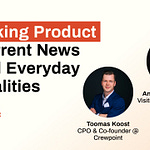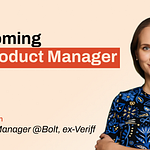This episode with Pavlo Pedenko is a refreshingly honest conversation about the messy, non-linear journey from PM to founder. We talk about what actually happens when you build a company on the side, raise money while employed, and figure out product-market fit with no code. If you’re tired of polished startup advice and want the real play-by-play — this one is for you.
And as always, some key takeaways from our conversation:
🚫 Generic advice is dangerous. Pavlo explains how following common startup and product mantras — like “quit your job” or “raise fast” — can backfire without context.
🧪 Product-market fit started with a Google Calendar. Before writing code, they hit 100K GMV with a landing page, a CRM, and some spreadsheets.
🧩 Find a core product insight. In their case - kids' schedules are non-negotiable. Moms would rather switch tutoring services than adjust lesson times — so time slot consistency became a competitive advantage.
🔁 Startups are built on conversations, not dashboards. Mathema’s early growth came from direct chats with parents — not funnels, frameworks, or fancy onboarding.
🔥 PM habits can hold you back. Transitioning from PM to founder means unlearning the habit of waiting for perfect data and following the process — sometimes you have to decide based on gut, speed, or first principles.
💸 You can raise while employed. Contrary to the usual playbook, Pavlo closed 70% of a funding round before quitting his day job
📉 They walked away from funding. Even after lining up investors, they chose to pause the round when growth outpaced operations — and cash started burning for the wrong reasons.
🎯 Hiring is hard — until you do the job yourself. They failed at hiring a creative marketer… until the founder learned the job, then found the right person.
💼 VC-backed vs. bootstrapped: it’s not just about money. VC gives you access to hungrier talent and long-term equity upside. Bootstrapping gives you control — but hiring gets harder.
👀 The real work of being a founder? Deciding where your time creates the most leverage. Even when it means giving up the product work you love.













